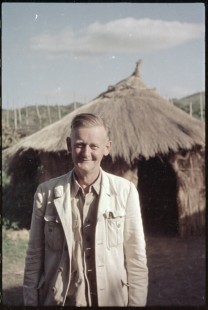Adolf Ellegard Jensen was born in Kiel in 1899. After finishing school he had to fight in World War I. In 1919 Jensen took up his studies of Mathematics, Natural Sciences and Philosophy in Kiel and Bonn. He finished his PhD in 1922.
After meeting Leo Frobenius he took up an assistant position at the newly founded Institute for Cultural Morphology (Institut für Kulturmorphologie) in Munich in 1923. Two years later Jensen followed Frobenius and the institute to Frankfurt/Main. Eventually he participated in a number of expeditions led by Frobenius, bringing him to South Africa and Libya.
In 1933 Jensen completed his habilitation thesis. He did further field researches, this time in Ethiopia and Ceram. In 1936 he became Custodian at the Anthropological Museum (today: Museum for the Cultures of the World) in Frankfurt.
When Leo Frobenius died in 1938, Jensen was supposed to be his successor. Due to his refusal to collaborate with the Nazi regime, Jensen was not appointed head chairman of the institute. Moreover, his permission to teach at the university was withdrawn by the Nazis in 1940 and Jensen was forced to become a soldier in World War II.
In 1945 Jensen became not only head chairman of the Anthropological Museum (today: Museum for the Cultures of the World) in Frankfurt. A year later he took up a full professorship at the university and was announced head of the Frobenius-Institute (previously: Institut für Kulturmorphologie). He participated at the first meeting of German anthropologists after WW II (Frankfurt/Main, 19.-21.09.1946).
Between 1951 and 1955 he did further field researches in Ethiopia.
Jensen adapted Frobenius' ideas on Cultural Morphology and applied them to his research on religion. His attempt of analyzing religious beliefs and practices through the different stages defined in Cultural Morphology opposed the usual theoretical positions of his time.
Adolf Ellegard Jensen died shortly after his retirement in 1965.
(This text by Vincenz Kokot is based on Alsayad/Seiler (eds.) 2005: Ethnologen-Lexikon. Berlin: WeißenseeVerlag, by courtesy of WeißenseeVerlag and Sibylle Alsayad; photo by courtesy of Frobenius-Institute)



